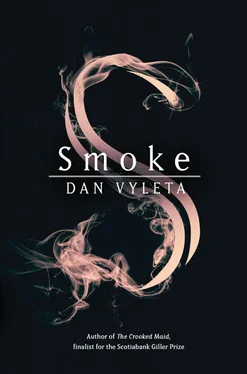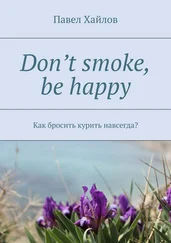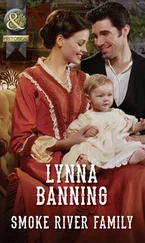“He’s out of his mind. What — we sneaked into Mother’s laboratory and now she’s going to kill us? Do you think she put on her riding skirts and a gun and staked us out? Or perhaps she sent Thorpe, the old man.”
“Or Julius.” It is Charlie who says it, beside her, quiet, his face open like a book.
“He wouldn’t shoot his own valet. The man is like a father to him!”
Her mouth is bitter with Smoke. Charlie does not respond. On the table, Thomas has slumped back into oblivion, one arm thrust into his open shirt, cradling his own chest. In the silence opened up by his faint, Livia feels herself drawn into Thomas’s doubts by her own lack of an explanation. To her side, the farmer stands, folding laundry. She has listened pretending not to listen. When Livia studies her face it is carefully neutral, the intelligence of her eyes locked away behind her half-drawn lids. It strikes Livia that this is a role at which the woman has had practice: acting dull when she’s expected to be. By her betters . The thought is new to Livia. She has lived around servants all her life but has never been in their quarters. Never in a farmhouse, never in a factory. It has not occurred to her that her whole life she has been watched by hooded eyes. Evaluated.
“Let’s go outside,” she says to Charlie.
ф
They argue quietly, five steps from the door. Her clothes remain wet and Livia shivers with cold.
“It makes no sense,” she says again.
“It might do. What if we saw something? In the laboratory. Something so important that it changes things. Something no one must know. No matter the price.” Charlie is calm, analytical, willing to forgive even his own murder. “Let’s think it through. The attack, I mean. Six shots, I make it. One after the other, but pretty quick. Shot at great distance. One gun or several? A marksman, in any case. If it were bandits, they’d want the horses alive. They are worth a great deal I should think.” He bites his lip. “If Thomas is right — if someone’s after us for what we know. . then it’s best if nobody knows that we are here. No one at all.”
Livia tries to dismiss his words, along with her own doubts. “Do you really think my mother would endanger her own daughter?”
“No. But you weren’t supposed to be there. You climbed on in secret. Outside the gates.” His eyes find hers, hold them, gently and with wonder. “Why did you?”
She wants to put him off with a non-answer, grow angry even, or prickly at least. But his face makes it difficult. It is open, like a book.
“I wanted to see you off. My mother discouraged my coming to the station with you. We had words about it last night. I decided to ignore her request.” She hesitates before going on. “I wanted to come to the station and say good-bye to you, Charlie. I even brought a handkerchief to wave.”
“I have been wanting to kiss you.” He says it firmly, like it is simply so, a fact like the sunshine around them and the grass at their feet.
Perhaps it is.
They go inside, and the farmer gives them blankets and sits them near the fire. She has stripped the wet things off Thomas and covered him with a bulky feather bed. Livia wishes she had a chance to change out of her own wet clothes. After some hesitation, she slides down from the hard wooden chair and kneels close to the fire, hoping it will dry her out.
Within minutes she is fast asleep.
ф
When she wakes the men are there. There are three of them, wearing plain fustian suits. They stand around the kitchen table, looking down at Thomas. A father and two sons. The sons have the same build: tall, high-shouldered, loose-limbed, and rangy. Their father is shorter, bigger-boned, holds a pipe clenched between thick, cold-chapped lips. Together, standing elbow to elbow, hip to hip, they make the cottage feel very small.
Livia rises quickly, coming out from beneath the blanket, her hands making sure she is decent. The movement wakes Charlie, slumped over in his chair. He leaps to his feet, sees the men, and immediately steps over to them.
“My name is Charlie Cooper. We thank you for your hospitality.”
He shakes hands in his simple, hearty way. The men seem bemused by the greeting but accept it in silence.
Then their eyes turn to Livia.
She hesitates, aware that it’s impossible to repeat Charlie’s gesture: it is unsuitable for ladies. The men don’t bow and it seems silly to curtsy. She can tell from their faces that they know who she is. The farmer has told them; she is at the stove now, watching the scene in silence. There is no way of putting the men at ease, not with the daughter of the man who owns the very land they stand on.
Livia tries the truth instead.
“I am Livia Naylor. We ran into trouble on the road this morning. Mr. Argyle here was wounded. At present we don’t know who. . That is, we think it best if nobody knows where we are.” She pauses, straightens. “Will you help us?”
The only answer she receives is a nod by the father. It is a thoughtful nod, only given after much contemplation. It seems to take the place of an oath.
ф
Nobody asks them any questions until after dinner. The men, it seems, don’t like to speak. All Livia has learned from them is their names. The father is Bill Mosley. The eldest son, dark-haired, with thick, drooping moustaches, is called Jake. His brother, Francis, is lighter haired and finer featured. He appears to be entirely mute. The farmer herself is called Janet and will not stand for Mrs. Mosley, as she thrice repeats. She alone is chatting away, working at the cooker.
“My men,” she explains in passing, “are miners, all three of them.”
The moment she says it Livia sees the black crescents that mark the fingertips at the edge of their nails; the black dust that has grown into their skin at the knuckles and dyed them blue. Other than that they are scrubbed scrupulously clean.
Dinner is a hearty affair of potato and cabbage soup, some rashers of bacon, and a tin-loaf of coarse brown bread. They have shifted Thomas from the table to a bed at the back of the cottage. Charlie gets up every few minutes to check on his friend.
“He’s awake. I’ll try to feed him some soup.”
Mrs. Mosley goes with him. It leaves Livia alone with the three men.
She watches them eat. The father is already done and sits fingering his pipe. The quiet one spoons his soup with an abstracted air, turned inward, smiling to himself. His brother is busy buttering his bread with a haste bordering on anger, as though the loaf is his personal enemy and needs to be cowed. All the while he is looking at Livia. It is not a friendly look.
“Preacher came to the mine today, Mum,” he suddenly starts declaiming, slowly and emphatically, still looking at Livia though it is his mother, behind him, he purports to be addressing. “Caught us while we were washing. No chance of escape. Always the same song. ‘Smoking is sin. Don’t think because you can’t see it, down the mine, that it is less so. God’s eyes. .’ And so on and so on.” He snorts, chews, swallows. “Smoking ain’t sin. It’s a weapon. Toffs use it to keep us down. Proves everything’s just as it should be, with them on top, smug like a bunch of dung beetles rolling their lunch.”
It is his father who answers him, calmly, in his slow thoughtful manner, laying the pipe down next to his plate.
“I don’t know, Jake, it ain’t as simple as that. Wish that it was. But it ain’t. Think of all them regular Smokers over in the village, the ones whose Smoke is full of hate. Collins, for one. Hazard. Lawrence. Old Jimmy Becket. Each of them a right little bugger. Liars, drunks, cheats. Might as well call it sin.”
The son bristles at this, but respects his father too much to contradict him outright.
Читать дальше












